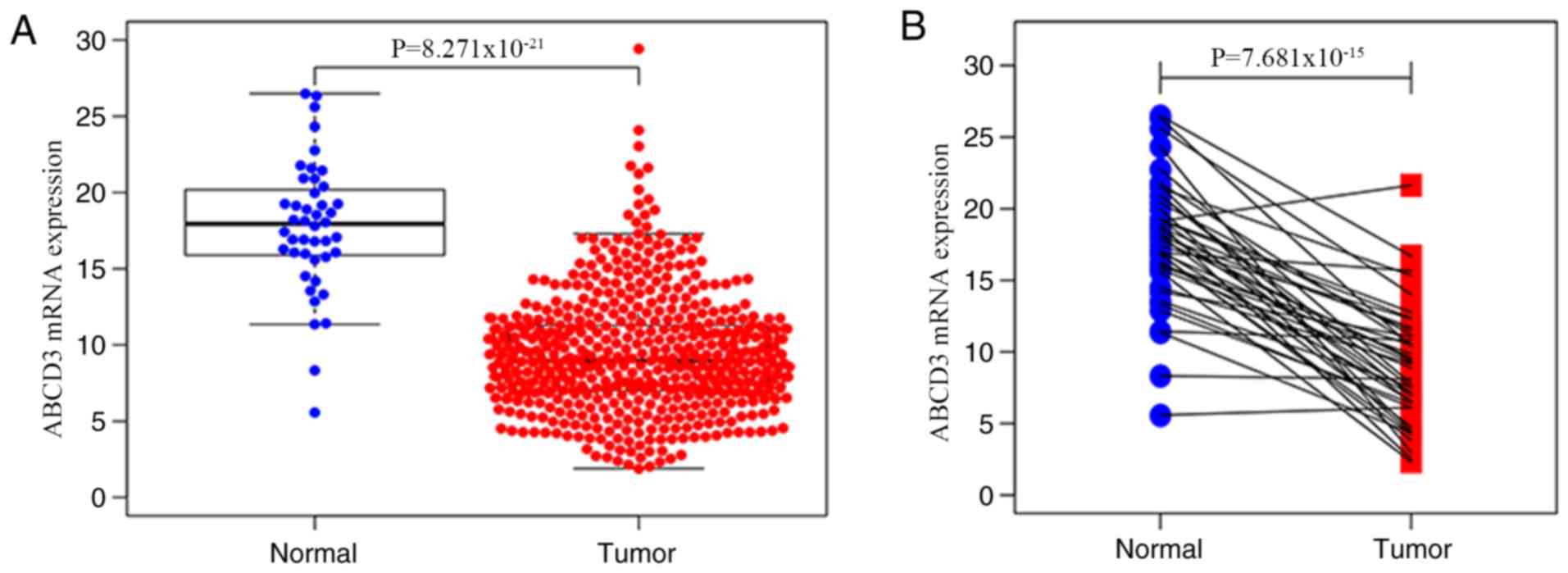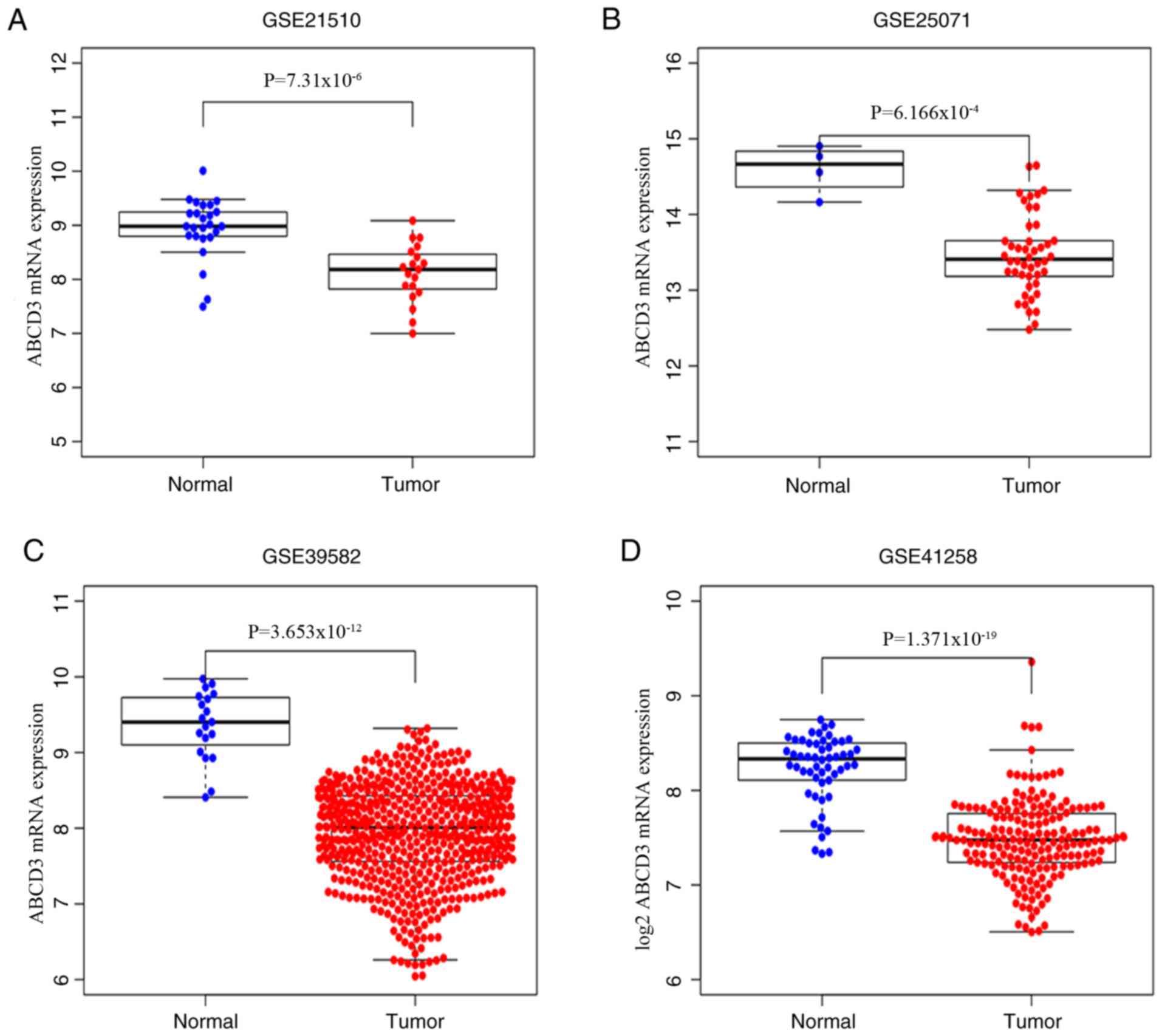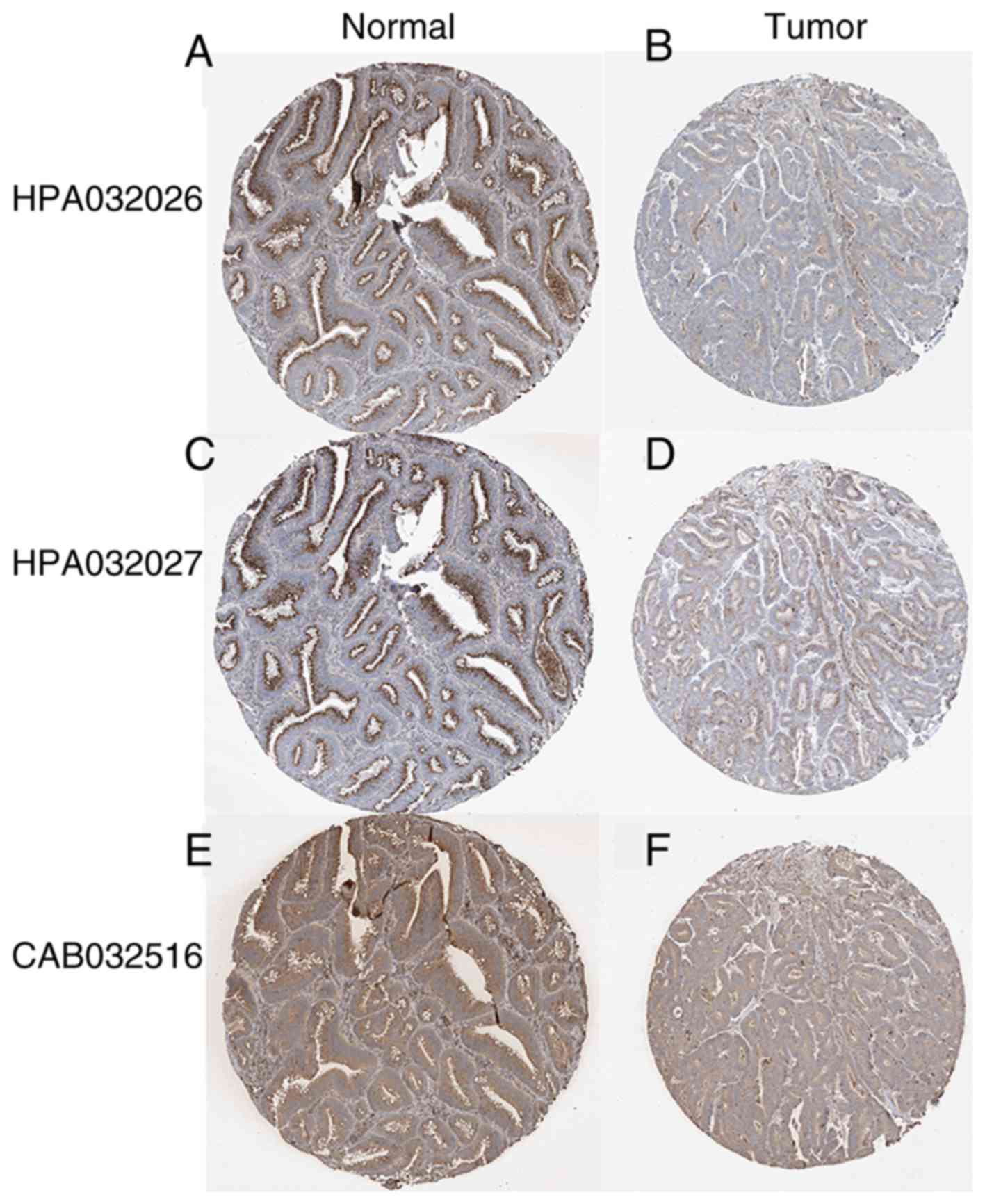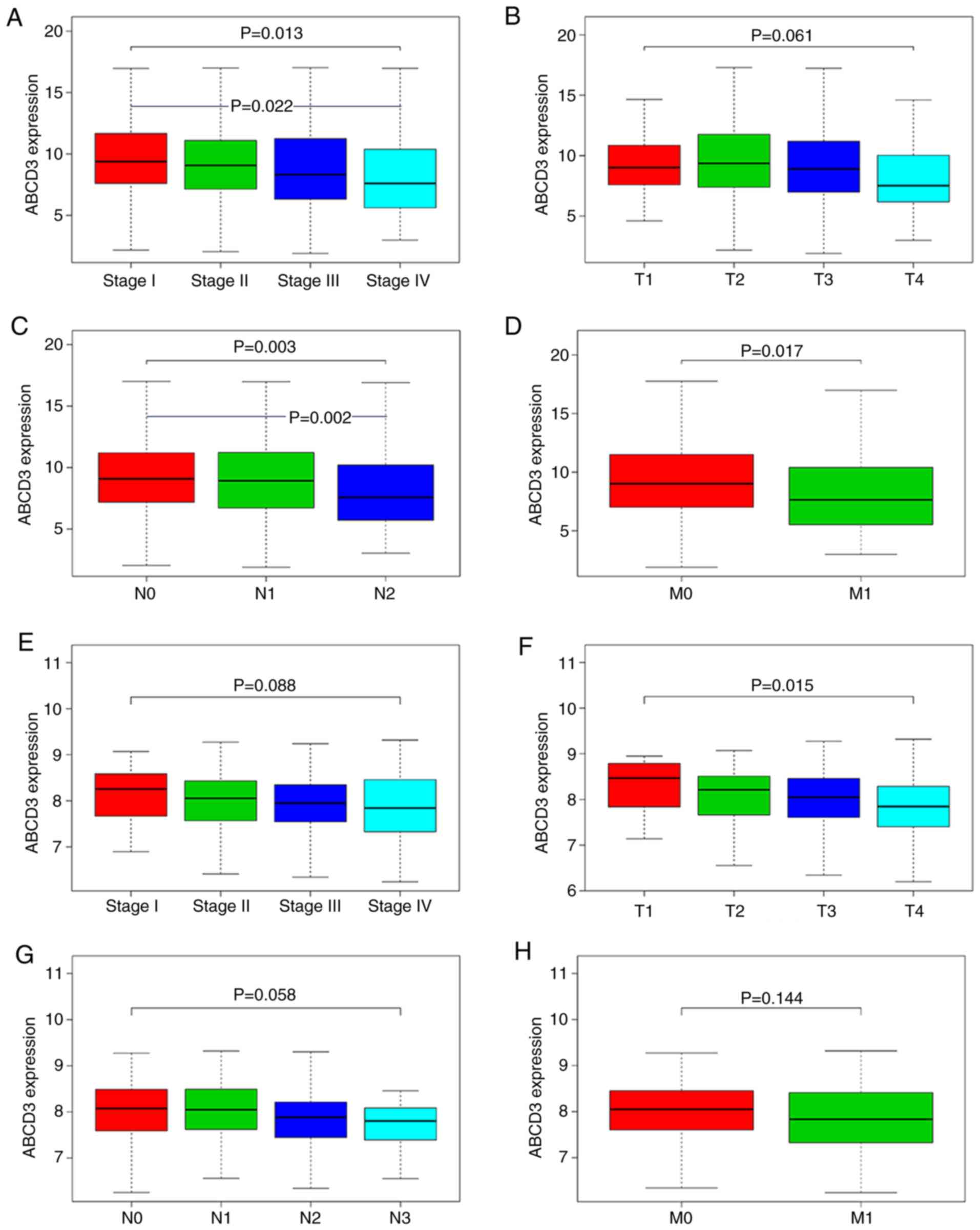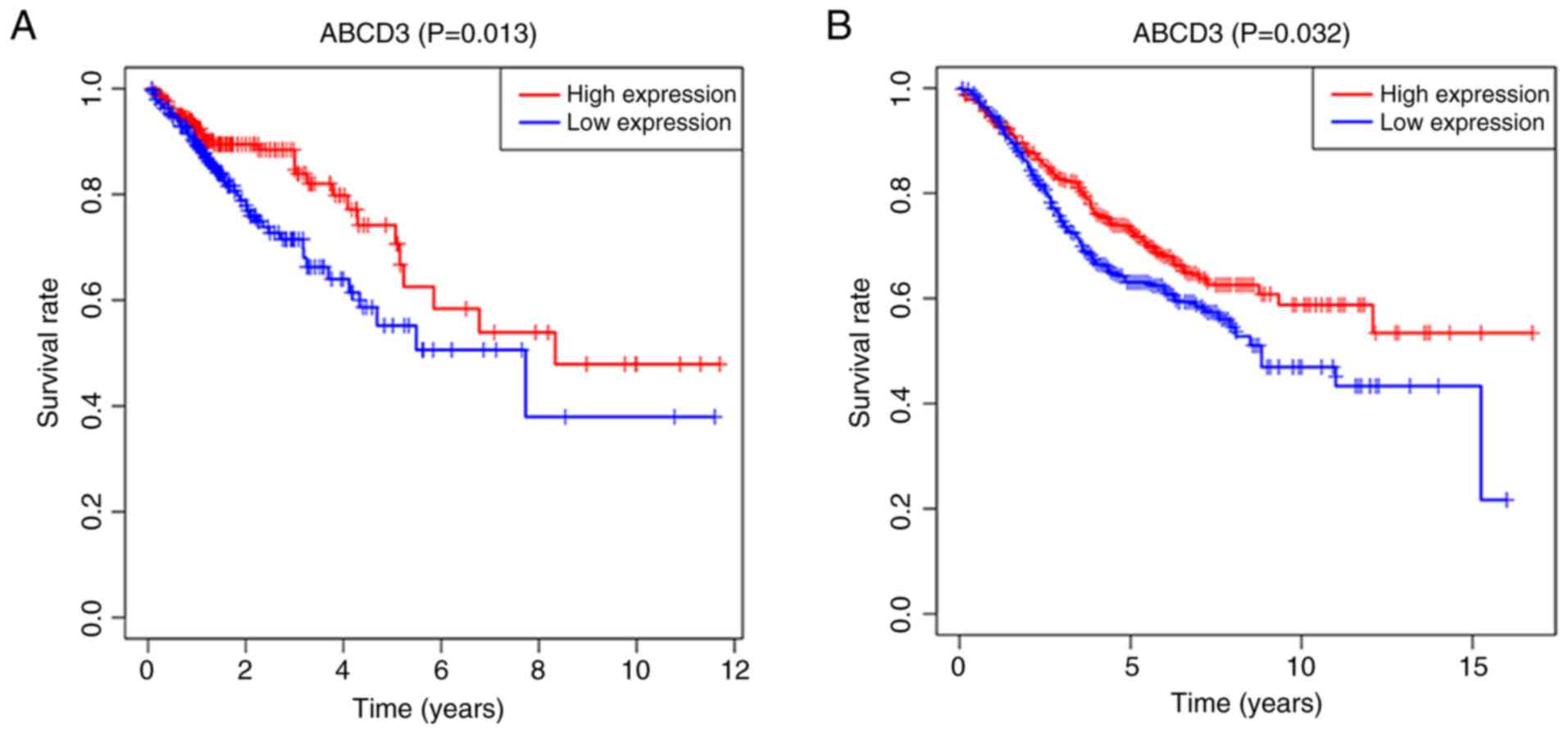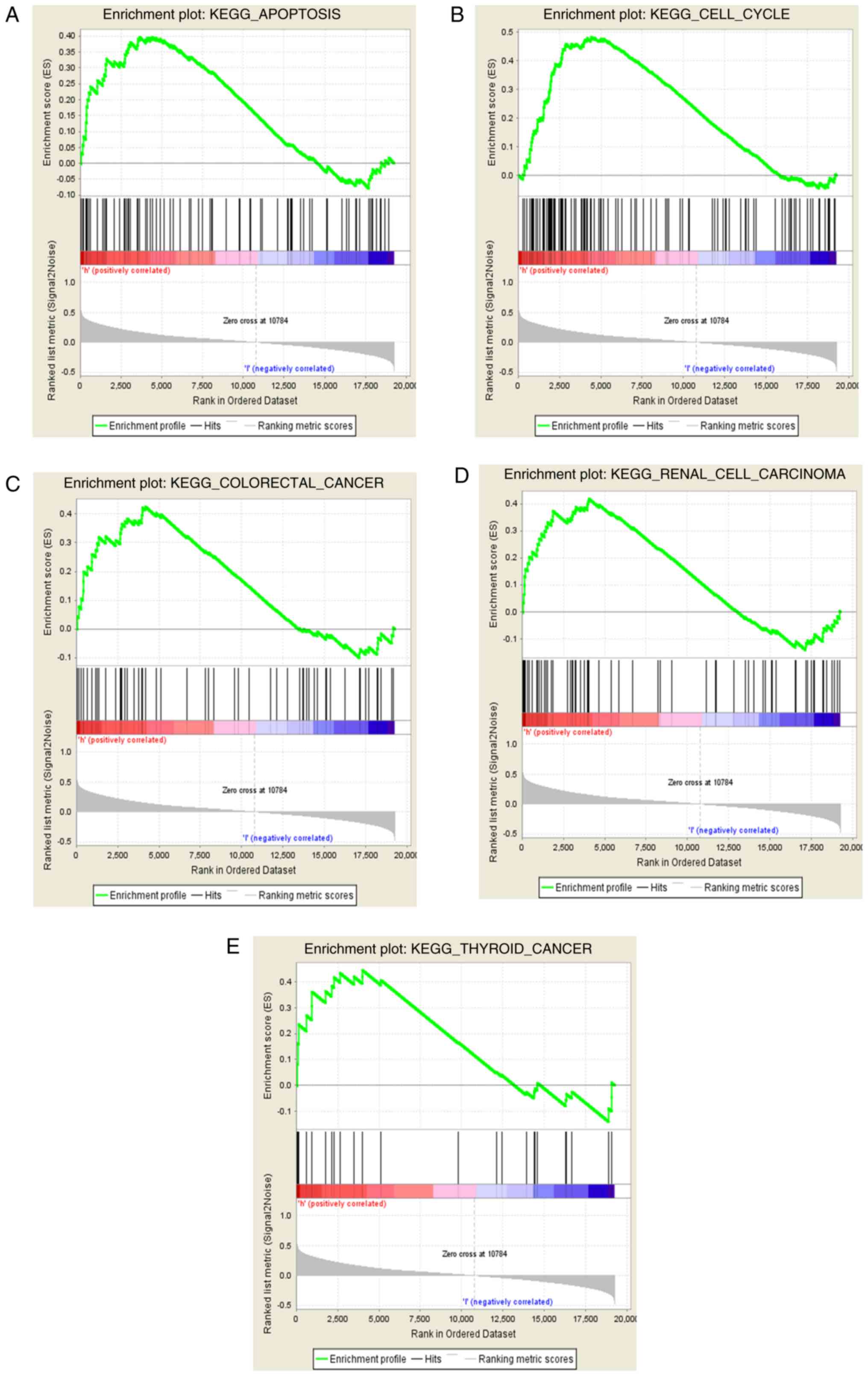|
1
|
Bray F, Ferlay J, Soerjomataram I, Siegel
RL, Torre LA and Jemal A: Global cancer statistics 2018: GLOBOCAN
estimates of incidence and mortality worldwide for 36 cancers in
185 countries. CA Cancer J Clin. 68:394–424. 2018. View Article : Google Scholar : PubMed/NCBI
|
|
2
|
Landreau P, Drouillard A, Launoy G,
Ortega-Deballon P, Jooste V, Lepage C, Faivre J, Facy O and Bouvier
AM: Incidence and survival in late liver metastases of colorectal
cancer. J Gastroenterol Hepatol. 30:82–85. 2015. View Article : Google Scholar : PubMed/NCBI
|
|
3
|
Asano H, Kojima K, Ogino N, Fukano H,
Ohara Y and Shinozuka N: Postoperative recurrence and risk factors
of colorectal cancer perforation. Int J Colorectal Dis. 32:419–424.
2017. View Article : Google Scholar : PubMed/NCBI
|
|
4
|
Al Bandar MH and Kim NK: Current status
and future perspectives on treatment of liver metastasis in
colorectal cancer (Review). Oncol Rep. 37:2553–2564. 2017.
View Article : Google Scholar : PubMed/NCBI
|
|
5
|
Gires O: Lessons from common markers of
tumor-initiating cells in solid cancers. Cell Mol Life Sci.
68:4009–4022. 2011. View Article : Google Scholar : PubMed/NCBI
|
|
6
|
Locker GY, Hamilton S, Harris J, Jessup
JM, Kemeny N, Macdonald JS, Somerfield MR, Hayes DF and Bast RC Jr:
ASCO: ASCO 2006 update of recommendations for the use of tumor
markers in gastrointestinal cancer. J Clin Oncol. 24:5313–5327.
2006. View Article : Google Scholar : PubMed/NCBI
|
|
7
|
Engstrom PF, Arnoletti JP, Benson AB 3rd,
Chen YJ, Choti MA, Cooper HS, Covey A, Dilawari RA, Early DS,
Enzinger PC, et al: NCCN Clinical practice guidelines in oncology:
Colon cancer. J Natl Compr Canc Netw. 7:778–831. 2009. View Article : Google Scholar : PubMed/NCBI
|
|
8
|
Rose J, Augestad KM and Cooper GS:
Colorectal cancer surveillance: What's new and what's next. World J
Gastroenterol. 20:1887–1897. 2014. View Article : Google Scholar : PubMed/NCBI
|
|
9
|
Labianca R, Nordlinger B, Beretta GD,
Brouquet A and Cervantes A; ESMO Guidelines Working Group, :
Primary colon cancer: ESMO Clinical practice guidelines for
diagnosis, adjuvant treatment and follow-up. Ann Oncol. 21 (Suppl
5):v70–v77. 2010. View Article : Google Scholar : PubMed/NCBI
|
|
10
|
Schmoll HJ, Van Cutsem E, Stein A,
Valentini V, Glimelius B, Haustermans K, Nordlinger B, van de Velde
CJ, Balmana J, Regula J, et al: ESMO Consensus Guidelines for
management of patients with colon and rectal cancer. a personalized
approach to clinical decision making. Ann Oncol. 23:2479–2516.
2012. View Article : Google Scholar : PubMed/NCBI
|
|
11
|
Kawaguchi K and Morita M: ABC transporter
subfamily D: Distinct differences in behavior between ABCD1-3 and
ABCD4 in subcellular localization, function, and human disease.
Biomed Res Int. 2016:67862452016. View Article : Google Scholar : PubMed/NCBI
|
|
12
|
Cole SP, Bhardwaj G, Gerlach JH, Mackie
JE, Grant CE, Almquist KC, Stewart AJ, Kurz EU, Duncan AM and
Deeley RG: Overexpression of a transporter gene in a
multidrug-resistant human lung cancer cell line. Science.
258:1650–1654. 1992. View Article : Google Scholar : PubMed/NCBI
|
|
13
|
Holla VR, Wu H, Shi Q, Menter DG and
DuBois RN: Nuclear orphan receptor NR4A2 modulates fatty acid
oxidation pathways in colorectal cancer. J Biol Chem.
286:30003–30009. 2011. View Article : Google Scholar : PubMed/NCBI
|
|
14
|
Yu T, Zhang H and Qi H: Transcriptome
profiling analysis reveals biomarkers in colon cancer samples of
various differentiation. Oncol Lett. 16:48–54. 2018.PubMed/NCBI
|
|
15
|
Seborova K, Vaclavikova R, Soucek P,
Elsnerova K, Bartakova A, Cernaj P, Bouda J, Rob L, Hruda M and
Dvorak P: Association of ABC gene profiles with time to progression
and resistance in ovarian cancer revealed by bioinformatics
analyses. Cancer Med. 8:606–616. 2019. View Article : Google Scholar : PubMed/NCBI
|
|
16
|
Reams RR, Jones-Triche J, Chan OT,
Hernandez BY, Soliman KF and Yates C: Immunohistological analysis
of ABCD3 expression in Caucasian and African American prostate
tumors. Biomed Res Int. 2015:1329812015. View Article : Google Scholar : PubMed/NCBI
|
|
17
|
Elsnerova K, Mohelnikova-Duchonova B,
Cerovska E, Ehrlichova M, Gut I, Rob L, Skapa P, Hruda M, Bartakova
A, Bouda J, et al: Gene expression of membrane transporters:
Importance for prognosis and progression of ovarian carcinoma.
Oncol Rep. 35:2159–2170. 2016. View Article : Google Scholar : PubMed/NCBI
|
|
18
|
Hlavata I, Mohelnikova-Duchonova B,
Vaclavikova R, Liska V, Pitule P, Novak P, Bruha J, Vycital O,
Holubec L, Treska V, et al: The role of ABC transporters in
progression and clinical outcome of colorectal cancer. Mutagenesis.
27:187–196. 2012. View Article : Google Scholar : PubMed/NCBI
|
|
19
|
Tsukamoto S, Ishikawa T, Iida S, Ishiguro
M, Mogushi K, Mizushima H, Uetake H, Tanaka H and Sugihara K:
Clinical significance of osteoprotegerin expression in human
colorectal cancer. Clin Cancer Res. 17:2444–2450. 2011. View Article : Google Scholar : PubMed/NCBI
|
|
20
|
Agesen TH, Berg M, Clancy T, Thiis-Evensen
E, Cekaite L, Lind GE, Nesland JM, Bakka A, Mala T, Hauss HJ, et
al: CLC and IFNAR1 are differentially expressed and a global
immunity score is distinct between early- and late-onset colorectal
cancer. Genes Immun. 12:653–662. 2011. View Article : Google Scholar : PubMed/NCBI
|
|
21
|
Sheffer M, Bacolod MD, Zuk O, Giardina SF,
Pincas H, Barany F, Paty PB, Gerald WL, Notterman DA and Domany E:
Association of survival and disease progression with chromosomal
instability: A genomic exploration of colorectal cancer. Proc Natl
Acad Sci USA. 106:7131–7136. 2009. View Article : Google Scholar : PubMed/NCBI
|
|
22
|
Marisa L, de Reyniès A, Duval A, Selves J,
Gaub MP, Vescovo L, Etienne-Grimaldi MC, Schiappa R, Guenot D,
Ayadi M, et al: Gene expression classification of colon cancer into
molecular subtypes: Characterization, validation, and prognostic
value. PLoS Med. 10:e10014532013. View Article : Google Scholar : PubMed/NCBI
|
|
23
|
Subramanian A, Tamayo P, Mootha VK,
Mukherjee S, Ebert BL, Gillette MA, Paulovich A, Pomeroy SL, Golub
TR, Lander ES and Mesirov JP: Gene set enrichment analysis: A
knowledge-based approach for interpreting genome-wide expression
profiles. Proc Natl Acad Sci USA. 102:15545–15550. 2005. View Article : Google Scholar : PubMed/NCBI
|
|
24
|
Robin X, Turck N, Hainard A, Tiberti N,
Lisacek F, Sanchez JC and Müller M: pROC: An open-source package
for R and S+ to analyze and compare ROC curves. BMC Bioinformatics.
12:772011. View Article : Google Scholar : PubMed/NCBI
|
|
25
|
Trojani A, Pungolino E, Dal Molin A,
Lodola M, Rossi G, D'Adda M, Perego A, Elena C, Turrini M, Borin L,
et al: Nilotinib interferes with cell cycle, ABC transporters and
JAK-STAT signaling pathway in CD34+/lin- cells of patients with
chronic phase chronic myeloid leukemia after 12 months of
treatment. PLoS One. 14:e02184442019. View Article : Google Scholar : PubMed/NCBI
|
|
26
|
Heimerl S, Bosserhoff AK, Langmann T,
Ecker J and Schmitz G: Mapping ATP-binding cassette transporter
gene expression profiles in melanocytes and melanoma cells.
Melanoma Res. 17:265–273. 2007. View Article : Google Scholar : PubMed/NCBI
|
|
27
|
Hendig D, Langmann T, Zarbock R, Schmitz
G, Kleesiek K and Gotting C: Characterization of the ATP-binding
cassette transporter gene expression profile in Y79: A
retinoblastoma cell line. Mol Cell Biochem. 328:85–92. 2009.
View Article : Google Scholar : PubMed/NCBI
|
|
28
|
Lauer C, Völkl A, Riedl S, Fahimi HD and
Beier K: Impairment of peroxisomal biogenesis in human colon
carcinoma. Carcinogenesis. 20:985–989. 1999. View Article : Google Scholar : PubMed/NCBI
|
|
29
|
Yasui K, Mihara S, Zhao C, Okamoto H,
Saito-Ohara F, Tomida A, Funato T, Yokomizo A, Naito S, Imoto I, et
al: Alteration in copy numbers of genes as a mechanism for acquired
drug resistance. Cancer Res. 64:1403–1410. 2004. View Article : Google Scholar : PubMed/NCBI
|
|
30
|
Fletcher JI, Williams RT, Henderson MJ,
Norris MD and Haber M: ABC transporters as mediators of drug
resistance and contributors to cancer cell biology. Drug Resist
Updat. 26:1–9. 2016. View Article : Google Scholar : PubMed/NCBI
|
|
31
|
Schuetz JD and Ishikawa T: ABC
transporters and cancer. Preface. Adv Cancer Res. 125:xv–xvii.
2015. View Article : Google Scholar : PubMed/NCBI
|
|
32
|
Begicevic RR and Falasca M: ABC
Transporters in cancer stem cells: Beyond chemoresistance. Int J
Mol Sci. 18:E23622017. View Article : Google Scholar : PubMed/NCBI
|
|
33
|
Fung SW, Cheung PF, Yip CW, Ng LW, Cheung
TT, Chong CC, Lee C, Lai PB, Chan AW, Tsao GS, et al: The
ATP-binding cassette transporter ABCF1 is a hepatic oncofetal
protein that promotes chemoresistance, EMT and cancer stemness in
hepatocellular carcinoma. Cancer Lett. 457:98–109. 2019. View Article : Google Scholar : PubMed/NCBI
|
|
34
|
Li Y, Zhai Z, Li H, Wang X, Huang Y and Su
X: Guajadial reverses multidrug resistance by inhibiting ABC
transporter expression and suppressing the PI3K/Akt pathway in
drug-resistant breast cancer cells. Chem Biol Interact. 305:98–104.
2019. View Article : Google Scholar : PubMed/NCBI
|
|
35
|
Hou L, Zhang X, Jiao Y, Li Y, Zhao Y, Guan
Y and Liu Z: ATP binding cassette subfamily B member 9 (ABCB9) is a
prognostic indicator of overall survival in ovarian cancer.
Medicine (Baltimore). 98:e156982019. View Article : Google Scholar : PubMed/NCBI
|















